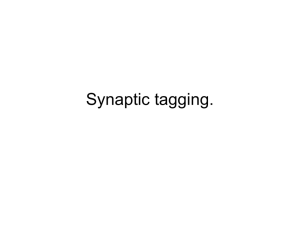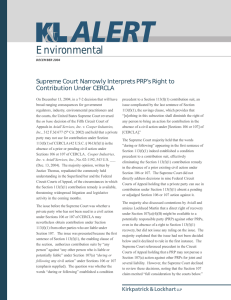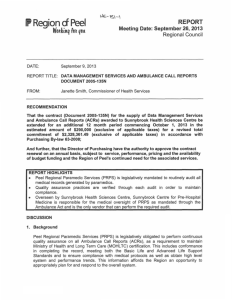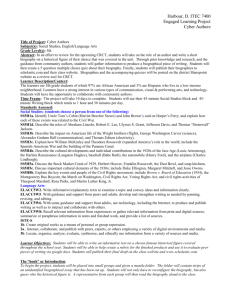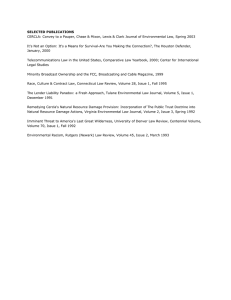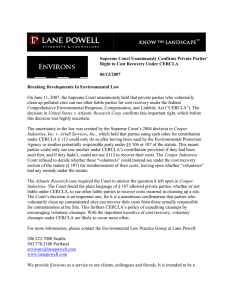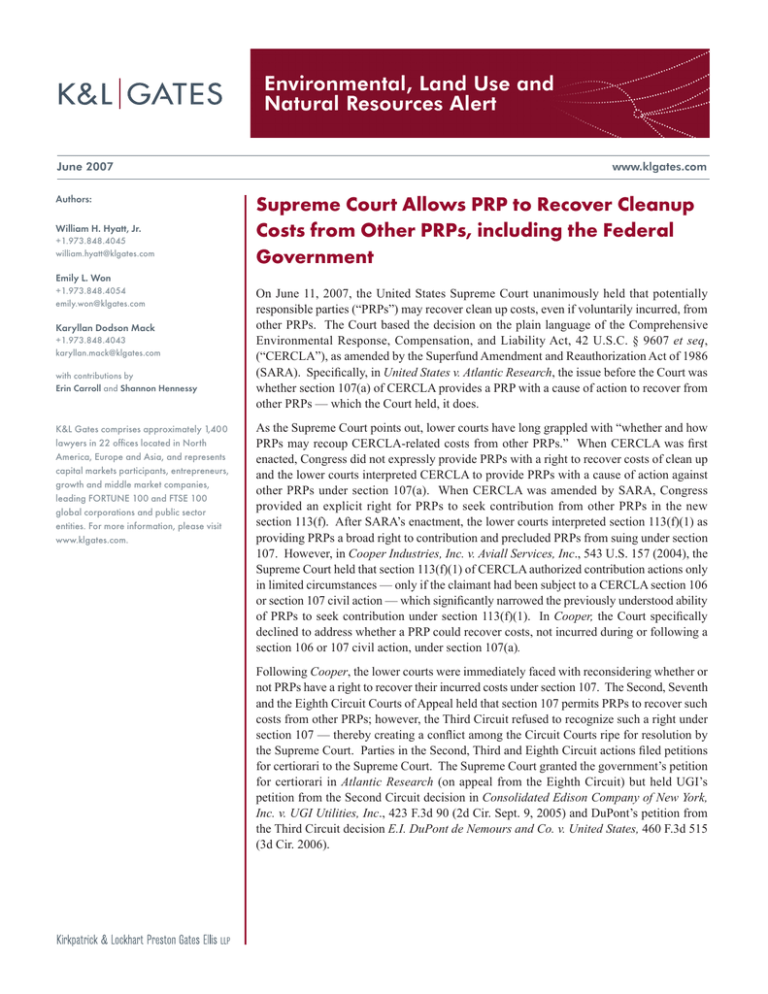
Environmental, Land Use and
Natural Resources Alert
June 2007
Authors:
William H. Hyatt, Jr.
+1.973.848.4045
william.hyatt@klgates.com
www.klgates.com
Supreme Court Allows PRP to Recover Cleanup
Costs from Other PRPs, including the Federal
Government
Emily L. Won
+1.973.848.4054
emily.won@klgates.com
Karyllan Dodson Mack
+1.973.848.4043
karyllan.mack@klgates.com
with contributions by
Erin Carroll and Shannon Hennessy
K&L Gates comprises approximately 1,400
lawyers in 22 offices located in North
America, Europe and Asia, and represents
capital markets participants, entrepreneurs,
growth and middle market companies,
leading FORTUNE 100 and FTSE 100
global corporations and public sector
entities. For more information, please visit
www.klgates.com.
On June 11, 2007, the United States Supreme Court unanimously held that potentially
responsible parties (“PRPs”) may recover clean up costs, even if voluntarily incurred, from
other PRPs. The Court based the decision on the plain language of the Comprehensive
Environmental Response, Compensation, and Liability Act, 42 U.S.C. § 9607 et seq,
(“CERCLA”), as amended by the Superfund Amendment and Reauthorization Act of 1986
(SARA). Specifically, in United States v. Atlantic Research, the issue before the Court was
whether section 107(a) of CERCLA provides a PRP with a cause of action to recover from
other PRPs — which the Court held, it does.
As the Supreme Court points out, lower courts have long grappled with “whether and how
PRPs may recoup CERCLA-related costs from other PRPs.” When CERCLA was first
enacted, Congress did not expressly provide PRPs with a right to recover costs of clean up
and the lower courts interpreted CERCLA to provide PRPs with a cause of action against
other PRPs under section 107(a). When CERCLA was amended by SARA, Congress
provided an explicit right for PRPs to seek contribution from other PRPs in the new
section 113(f). After SARA’s enactment, the lower courts interpreted section 113(f)(1) as
providing PRPs a broad right to contribution and precluded PRPs from suing under section
107. However, in Cooper Industries, Inc. v. Aviall Services, Inc., 543 U.S. 157 (2004), the
Supreme Court held that section 113(f)(1) of CERCLA authorized contribution actions only
in limited circumstances — only if the claimant had been subject to a CERCLA section 106
or section 107 civil action — which significantly narrowed the previously understood ability
of PRPs to seek contribution under section 113(f)(1). In Cooper, the Court specifically
declined to address whether a PRP could recover costs, not incurred during or following a
section 106 or 107 civil action, under section 107(a).
Following Cooper, the lower courts were immediately faced with reconsidering whether or
not PRPs have a right to recover their incurred costs under section 107. The Second, Seventh
and the Eighth Circuit Courts of Appeal held that section 107 permits PRPs to recover such
costs from other PRPs; however, the Third Circuit refused to recognize such a right under
section 107 — thereby creating a conflict among the Circuit Courts ripe for resolution by
the Supreme Court. Parties in the Second, Third and Eighth Circuit actions filed petitions
for certiorari to the Supreme Court. The Supreme Court granted the government’s petition
for certiorari in Atlantic Research (on appeal from the Eighth Circuit) but held UGI’s
petition from the Second Circuit decision in Consolidated Edison Company of New York,
Inc. v. UGI Utilities, Inc., 423 F.3d 90 (2d Cir. Sept. 9, 2005) and DuPont’s petition from
the Third Circuit decision E.I. DuPont de Nemours and Co. v. United States, 460 F.3d 515
(3d Cir. 2006).
Environmental, Land Use and
Natural Resouces Alert
In Atlantic Research, the respondent leased property
operated by the Department of Defense where it
retrofitted rocket motors for the petitioner, United
States. Atlantic Research removed and burned pieces
of propellant from motors and the resulting wastewater
and burned fuel caused contamination of the soil and
groundwater. Atlantic Research initiated suit against
the United States to recover some of its costs under
both section 107(a) and 113(f). The District Court
granted the United States’ motion to dismiss Atlantic
Research’s section 107(a) claim. Atlantic Research
appealed and the Eighth Circuit found that Cooper
undermined the reasoning of its prior precedent and
noted that 113(f) is not the only route by which PRPs
may recover costs. The Eight Circuit reversed the
District Court holding that Atlantic Research does
have a section 107(a)(4)(B) claim against the United
States.
The Supreme Court agreed. CERCLA section 107(a)
states that “any person” in the four enumerated
categories of PRPs shall be liable for, among other
things, “(A) all costs of removal or remedial action
incurred by the United States Government or a State
or an Indian tribe not inconsistent with the national
contingency plan; [and] (B) any other necessary costs
of response incurred by any other person consistent
with the national contingency plan.” Section 113(f)(1)
provides that “any person may seek contribution from
any other person who is liable or potentially liable
under section 107(a), during or following any civil
action under section 106 or under section 107(a) [and]
[n]othing in this subsection shall diminish the right of
any person to bring an action for contribution in the
absence of a civil action under section 106 or section
107.”
The Supreme Court noted that the statute must be read
as a whole. Thus, the Court stated that subparagraph
(B) of section 107(a) can only be understood with
reference to subparagraph (A). Accordingly, the
natural reading of the statute is to interpret the phrase
“any other person” to mean any person other than the
United States, a State, or an Indian tribe. The Court
explained that section 107(a) and section 113(f) create
complementary but distinct rights: section 107(a)
permits the recovery of costs incurred in cleaning
contaminated sites; whereas, section 113(f) explicitly
grants PRPs a right to contribution. Therefore, the
Court concluded, under a plain reading of the statute,
any private party, including PRPs, can bring a cost
recovery action against other PRPs.
In affirming the Eighth Circuit decision, the Supreme
Court rejected the government’s arguments that (1)
section 107(a) does not allow PRPs to recover costs
from other PRPs and that section 113(f) is the exclusive
route by which a PRP may seek contribution from other
PRPs; (2) Atlantic Research’s interpretation would
effectively allow PRPs to evade section 113(f)’s shorter
statute of limitations; (3) PRPs will avoid equitable
apportionment under section 113(f) and instead pursue
joint and several liability under section 107(a); and
(4) providing a right of contribution for parties who
voluntarily clean up contaminated sites frustrates
Congress’s intent to encourage supervised cleanups
through settlements with the government. The
government argued that by allowing pre-enforcement
contribution claims, PRPs could evade section 113(f)’s
settlement bar, which protects settling parties from
lawsuits by other PRPs.
The Court refused to adopt the government’s reading
of the statute, which would have precluded virtually all
PRPs who had not been sued or had not settled with the
government from recovering costs. Specifically, the
Court rejected the government’s statute of limitations
argument since sections 107(a) and 113(f) provide
“complementary yet distinct” rights and remedies
for persons “in different procedural circumstances.”
Therefore, the Court concluded, there is no choice of
remedies for PRPs. Similarly, a PRP cannot avoid
section 113(f)’s equitable distribution of costs among
PRPs by seeking to impose joint and several liability
under section 107(a), because any defendant PRP could
simply file a section 113(f) counterclaim. Finally,
the Court doubted that allowing suits under section
107(a) would eviscerate the settlement bar set forth
in section 113(f)(2) or discourage settlement since a
PRP sued for cost recovery under section 107(a) may
trigger equitable apportionment by filing a section
113(f) counterclaim and district courts exercising
their equitable discretion would be expected to
consider any prior settlements as part of the liability
calculation. Furthermore, the Court noted that PRPs
would continue to seek to settle with the government
because “settlement carries the inherent benefit of
finally resolving liability as to the United States or a
State.” Thus, the Court was not persuaded by any of
the government’s arguments.
June 2007 | Environmental, Land Use and
Natural Resouces Alert
Had the Supreme Court refused to allow a section
107(a) claim for PRPs seeking cost recovery from other
PRPs, it is likely that the number of private parties
conducting voluntary cleanups would significantly
decline — a result that is contrary to CERCLA’s
legislative intent. As pointed out by the thirty-eight
states filing a brief as Amicus Curiae, the federal and
state governments do not have the resources necessary
to bring all the CERCLA actions needed to clean up
all hazardous waste sites in the United States, and
PRPs conducting voluntarily cleanups advance
CERCLA’s goal of encouraging prompt cleanups and/
or settlements, given the threat of potential litigation
from other PRPs.
As of result of the Atlantic Research decision, it is
likely that the Supreme Court will deny the petition
for certiorari filed by UGI and grant the petition filed
by DuPont, remanding the DuPont case to the Third
Circuit for proceedings consistent with the Atlantic
Research decision. As for other PRPs who have not
been sued or who have not settled with the government
but who have incurred clean up costs, the Supreme
Court’s holding that section 107(a) authorizes private
parties to recover their voluntarily incurred cleanup
costs from other PRPs will ensure that parties who
conduct voluntary cleanups have the right to recoup
their costs from other PRPs. Although this result
will likely lead to a proliferation of cost recovery
and contribution suits in the near term future, it is
a result that is consistent with CERCLA’s goals of
incentivizing private parties to conduct early cleanups
and placing the cost of the cleanup on all responsible
parties — including governmental entities.
K&L Gates comprises multiple affiliated partnerships: a limited liability partnership with the full name Kirkpatrick & Lockhart Preston Gates Ellis LLP qualified in
Delaware and maintaining offices throughout the U.S., in Berlin, and in Beijing (Kirkpatrick & Lockhart Preston Gates Ellis LLP Beijing Representative Office); a
limited liability partnership (also named Kirkpatrick & Lockhart Preston Gates Ellis LLP) incorporated in England and maintaining our London office; a Taiwan
general partnership (Kirkpatrick & Lockhart Preston Gates Ellis) which practices from our Taipei office; and a Hong Kong general partnership (Kirkpatrick &
Lockhart Preston Gates Ellis, Solicitors) which practices from our Hong Kong office. K&L Gates maintains appropriate registrations in the jurisdictions in which
its offices are located. A list of the partners in each entity is available for inspection at any K&L Gates office.
This publication/newsletter is for informational purposes and does not contain or convey legal advice. The information herein should not be used or relied
upon in regard to any particular facts or circumstances without first consulting a lawyer.
Data Protection Act 1998—We may contact you from time to time with information on Kirkpatrick & Lockhart Preston Gates Ellis LLP seminars and with our
regular newsletters, which may be of interest to you. We will not provide your details to any third parties. Please e-mail london@klgates.com if you would prefer
not to receive this information.
©1996-2007 Kirkpatrick & Lockhart Preston Gates Ellis LLP. All Rights Reserved.
June 2007 |

